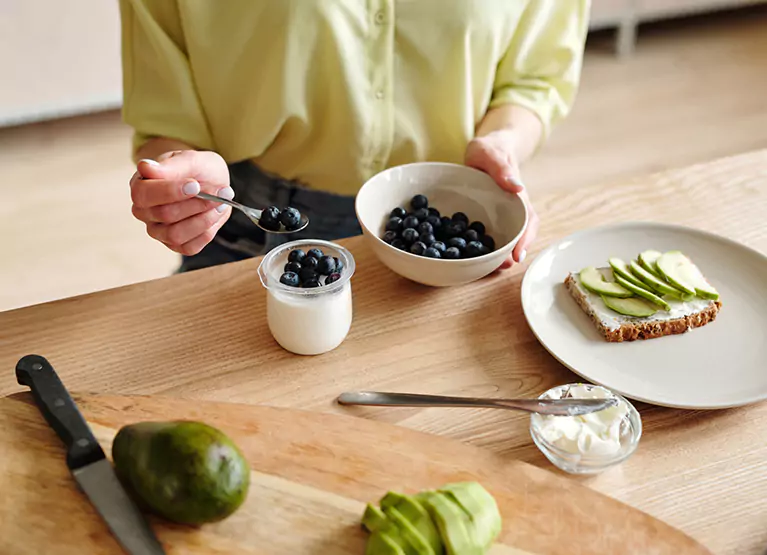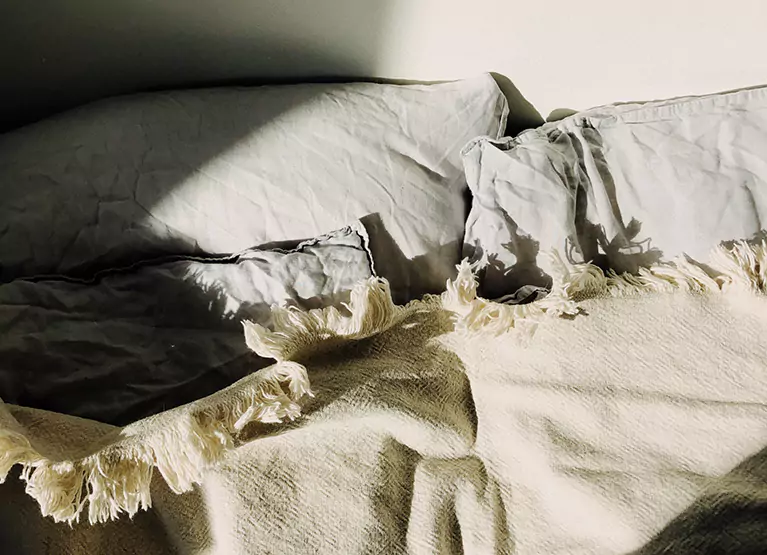Does Keto Affect Sleep?

Key Takeaways
The keto diet is quickly becoming a popular way of eating for those with goals such as weight loss, blood sugar management, and better metabolic health.
The ketogenic diet is characterized by a very low carbohydrate intake. Ranges can vary, but in general, experts recommend that 70 to 80 percent of the calories you consume come from fats, 10 to 20 percent from protein, and five to 10 percent come from carbohydrates.
When people first start on this diet, they might experience what’s known as the keto flu, and may even notice a variety of changes to their energy levels and sleep patterns.
If you’ve started this diet and are curious to learn more about the link between keto and sleep, you’ve come to the right place. Let’s explore how keto affects different bodily systems and how this may alter your sleep.
How Can a Keto Diet Improve Sleep?

The keto diet was originally used as a treatment for epilepsy, but it’s since been shown to have other potentially beneficial health effects.
For example, one small research study showed that the metabolism of fat on a very low carbohydrate diet, such as the keto diet, positively altered sleep activity in the individuals who were observed.
Specifically, it appeared to promote an increase in slow wave sleep, which is a stage of deep sleep, as compared to the sleep of people following a higher carb diet. It also reduced REM sleep, which is where dreaming occurs. Slow wave sleep is important for recovery and restoration, and can help you feel more rested.
Let’s take a look at some other specific ways in which the keto diet can positively affect sleep quality.
Ketosis Helps with Blood Sugar Regulation
Elevated or abnormal glucose levels have been linked to poor sleep quality. For some individuals, the keto diet can help improve blood sugar levels, potentially leading to better sleep.
Studies show that the keto diet can have a positive effect on glycemic control (as well as on blood lipid or blood fat levels), which is why it’s commonly used as a complementary treatment for type 2 diabetes.
Research shows that individuals with type 2 diabetes, which is associated with poor glycemic control, are also more likely to have obstructive sleep apnea, or OSA, which can hinder your sleep quality.
Because poor blood glucose is associated with poor sleep or other sleep-related disorders, improving glycemic control on the keto diet may be one way to improve sleep quality.
Keto Diet Promotes Adenosine
Adenosine is an important compound that is connected to many bodily processes involving the brain and central nervous system.
Research shows that the ketogenic diet can help promote extracellular adenosine in the body. Higher adenosine levels have been linked to improved quality and quantity of sleep in children with epilepsy.
Though more research is still needed to determine how the ketogenic diet plays a role in this connection beyond those with epilepsy, this diet does appear to support better sleep quality in some people.
Keto Diet for Weight Loss

Some people find success using the ketogenic diet for weight loss. Interestingly, a weight loss of even five to 10 percent has been found to improve poor sleeping patterns in individuals with obstructive sleep apnea.
Conversely, adequate sleep can play a major role in treating obesity and in making weight loss progress.
If you’re new to the keto diet, it may be helpful to measure your carbohydrate intake using a diet tracking app to determine what the ratio might be for you and your health goals.
Possible Reasons Why You Can’t Sleep On a Keto Diet
While the keto diet may be linked to some improvements in sleeping patterns in the long term, it may also hinder your ability to get quality sleep in the short term.
Here are three of the most common reasons why people have trouble getting quality sleep on the keto diet.
Your Body is Going Through a Carb Withdrawal

As mentioned before, individuals starting out on the keto diet may experience something that’s known as the “keto flu,” which can occur during the adjustment period as your body gets used to the removal of carbohydrates from your diet.
Though there are many reported symptoms of the keto flu, some of the ways in which the adjustment can manifest itself is through fatigue and difficulty sleeping. So if you’re not feeling rested when you wake up, your body may very well be going through a carb withdrawal.
Fortunately, the keto flu is temporary and will subside as your body adjusts.
Increased Fat Consumption
When following a keto diet, up to 80 percent of your daily calorie intake will come from fats. Recent research suggests that a high-fat diet may be linked to poor sleep quality as well as daytime sleepiness and an increased risk of sleep apnea.
The connection between this diet and sleep quality is still being studied to determine how increased fat consumption may be connected to metabolism.
You Have to Get Up in the Middle of the Night to Pee
Another common side effect of the ketogenic diet is excessive urination. This symptom, also known as polyuria, can cause you to lose electrolytes such as sodium and magnesium, and can even lead to dehydration.
Since you’re consuming fewer carbohydrates, the body begins burning glycogen stores which can lead to more water and minerals being expelled in the form of urine or sweat.
Fortunately, most people find that symptoms like excessive urination and temporary electrolyte imbalances subside after the first week or so of following the keto diet.
Best Practices for Quality Sleep on a Keto Diet

Generally speaking, a major factor in getting high quality sleep, whether you’re on the keto diet or not, is improving your sleep hygiene.
Practicing proper sleep hygiene can boost your sleep quality, and leave you feeling refreshed and rested in the mornings. However, it becomes even more important if you find your sleep to be impacted by the keto diet.
So, here are our top sleep hygiene tips to put into practice to get your beauty sleep.
Get 15-30 Minutes of Sunlight Early In the Day
Getting 15 to 30 minutes of sunlight early in the morning or day can help regulate your circadian rhythm, which can improve your sleep quality.
Starting your day with a walk outdoors or sipping your morning coffee on the porch can help you get to bed earlier in the night. It may also help the body go into the appropriate sleep or rest mode at the right time.
Cut-Off Screen Time 1-2 Hours Before Bed
Blue light at nighttime can also interfere with the circadian rhythm and lead to poor quality sleep. So, cutting off screen time one or two hours before bedtime can help ensure better sleep quality.
Reducing your screen time can help your mind decompress and relax. When your body is in a relaxed mode, it’ll be easier to fall asleep, and help improve your sleep quality.
Avoid Drinking Caffeine in the Afternoon

Part of practicing good sleep hygiene means stopping caffeine consumption eight hours before bed. This is because caffeine has a huge impact on sleep quality and your circadian rhythm.
Research shows that caffeine can interfere with melatonin, a key sleep regulator, production in the nighttime. Melatonin inhibition can contribute to poor sleep quality.
Keep Your Room Cool (65-70 Degrees)
Sleeping in a cold room may also lead to better sleep. Sleep researchers have found that cool temperatures can help slow down and relax the body, leading to deeper (and better) sleep.
To get the temperature down, you can try getting a portable AC for your sleeping space. Other options to keep your room cool include keeping your windows open during the night (if you don’t live in a noisy area) or keeping your central AC on during the night.
Consider Getting Blackout Blinds
Along with keeping your room cool, you may want to consider getting blackout blinds. This may be especially helpful if you live in an area with a lot of light pollution.Light pollution can lead to increased exposure to blue light, which as we mentioned, can interfere with the proper sleep processes and reduced sleep quality.
For some, sleeping with any sort of light on has even been linked to depression.
Increase Physical Activity
Getting plenty of exercise has been linked to better overall sleep. Plus, increasing physical activity, especially on the keto diet, can improve blood sugar levels.
So you may want to incorporate more physical activity into your day such as walking or staying consistent with your workout routine.
Find Ways to Relax and Unwind Before Bedtime

Relaxation is key for better sleep. Creating a nighttime routine around your bedtime can be helpful in relaxing and unwinding before bedtime.
When your mind is quiet and calm, you may find it much easier to drift off to sleep. It may also improve your sleep quality.Some ideas to unwind before bedtime include:
- Turning off your screens an hour before bed
- Turning on a softer light or a red light
- Lighting a candle with a soothing scent
- Reading a favorite book of yours
- Journaling about your day
- Meditating
- Doing a quick gratitude practice
- Trying a soothing nighttime yoga practice
Find the right Nutrisense programto turn insight into progress.
Go Beyond Glucose Data with Nutrisense
Your glucose can significantly impact how your body feels and functions. That’s why stable levels are an important factor in supporting overall wellbeing. But viewing glucose isn't enough. Nutrisense, you’ll be able to learn how to use your body's data to make informed lifestyle choices that support healthy living.
One-to-one coaching
Sign up to access insurance-covered video calls to work with a glucose expert: a personal registered dietitian or certified nutritionist who will help tailor your lifestyle and diet to your goals.
Monitor and measure what matters
With the Nutrisense CGM Program, you can monitor your glucose with health tech like glucose biosensors and continuous glucose monitor (CGM)s, and analyze the trends over time with the Nutrisense App. This will help you make the most informed choices about the foods you consume and their impact on your health.
Find your best fit
Ready to take the first step? Start with our quiz to find the right Nutrisense program to help you take control.

Jordyn has a bachelor’s degree in biology, a graduate degree in Human Nutrition and completed a dietetic internship at the Memphis VA. She's a dietitian at Nutrisense, and has experience working as a clinical dietitian at a VA medical center specializing in oncology and at the Mayo Clinic, working with a wide range of patients ranging from neonates in the NICU to adult ICU.




